The Sustainability Merit Badge Guide empowers Scouts with the knowledge and skills to become environmental stewards and make a positive impact on their communities and the world.
Through hands-on activities and engaging discussions, Scouts explore the principles of sustainable living, energy efficiency, water conservation, waste reduction, and community involvement.
Environmental Stewardship

Environmental stewardship encompasses the responsible use and conservation of natural resources to ensure their availability for future generations. It involves understanding the interconnectedness of ecosystems and human activities, and adopting practices that minimize environmental impact.
Conserving natural resources, such as water, energy, and forests, is crucial for sustaining life and maintaining a healthy planet. Sustainable land use practices, like responsible farming and urban planning, help preserve biodiversity, prevent soil erosion, and reduce pollution.
Reducing Environmental Impact
- Reduce, reuse, and recycle materials to minimize waste.
- Conserve energy by using energy-efficient appliances and practices.
- Use public transportation, walk, or bike instead of driving whenever possible.
- Choose sustainable products and services that minimize environmental harm.
- Support organizations and initiatives that promote environmental conservation.
Energy Efficiency
Energy efficiency is the practice of using energy wisely to reduce energy consumption. By using energy-efficient practices, we can reduce our reliance on fossil fuels, save money, and protect the environment.
There are many different types of energy sources, including fossil fuels (such as oil, gas, and coal), renewable energy (such as solar, wind, and hydro), and nuclear energy.
Benefits of Renewable Energy
- Renewable energy is a clean and sustainable source of energy.
- Renewable energy does not produce greenhouse gases, which contribute to climate change.
- Renewable energy can help to reduce our dependence on foreign oil.
- Renewable energy can create jobs and boost the economy.
Tips for Reducing Your Energy Consumption
- Turn off lights when you leave a room.
- Unplug electronics when you’re not using them.
- Use energy-efficient appliances.
- Insulate your home.
- Drive less and walk or bike more.
Water Conservation
Water conservation is crucial for the sustainability of our planet. With a growing population and increasing water consumption, it’s imperative to take measures to preserve this precious resource.
Conserving water not only reduces strain on natural resources but also saves energy and money. Implementing water-saving practices in our daily lives can significantly contribute to environmental stewardship.
Reducing Water Usage, Sustainability merit badge guide
There are numerous ways to reduce water usage in various aspects of our lives:
- Household:Install low-flow showerheads, faucets, and toilets; fix leaks promptly; use efficient appliances; water lawns sparingly; and collect rainwater for non-potable uses.
- Industry:Implement water-efficient cooling systems, use recycled water in manufacturing processes, and monitor water usage to identify areas for improvement.
- Agriculture:Employ drip irrigation, use drought-tolerant crops, and implement soil moisture monitoring to optimize water application.
Benefits of Water Conservation
Conserving water brings numerous benefits, including:
- Environmental preservation:Protects water sources, ecosystems, and biodiversity.
- Energy savings:Pumping and treating water consumes significant energy; reducing usage lowers energy consumption.
- Financial savings:Water-efficient practices can reduce water and energy bills, saving money for households and businesses.
- Sustainability:Ensures the availability of clean water for future generations.
Waste Reduction
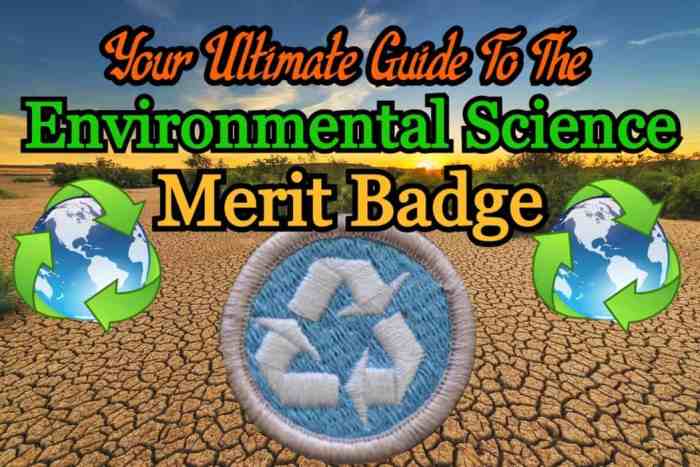
Waste reduction involves minimizing the amount of waste produced. Waste can be classified into various types, including solid waste, liquid waste, and gaseous waste. Solid waste refers to discarded materials, such as paper, plastic, metal, glass, and food scraps. Liquid waste includes wastewater from homes, industries, and agricultural activities.
Gaseous waste encompasses emissions released into the atmosphere, such as carbon dioxide, methane, and nitrogen oxides.
Importance of Recycling and Composting
Recycling and composting play crucial roles in waste reduction. Recycling involves processing used or discarded materials into new products. It conserves natural resources, reduces energy consumption, and minimizes landfill waste. Composting, on the other hand, is the controlled decomposition of organic materials, such as food scraps and yard waste, to create a nutrient-rich soil amendment.
Tips for Reducing Waste Output
- Reduce:Choose reusable items over single-use plastics, opt for products with less packaging, and repair or repurpose items instead of discarding them.
- Reuse:Find creative ways to reuse items, such as using old clothes as rags or donating them to charities.
- Recycle:Properly dispose of recyclable materials, such as paper, plastic, metal, and glass, in designated recycling bins.
- Compost:Set up a compost bin to recycle organic waste and create nutrient-rich soil for gardening.
- Buy in bulk:Purchasing items in bulk reduces packaging waste and can save money in the long run.
Sustainable Living
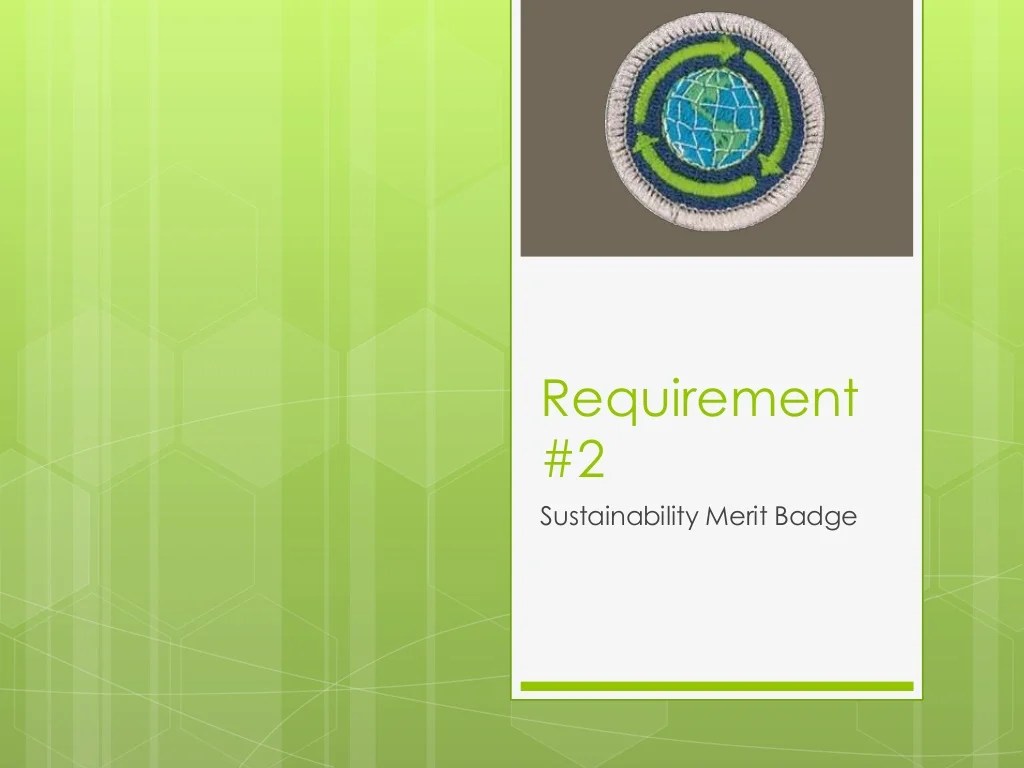
Sustainable living refers to a lifestyle that aims to minimize the negative impact on the environment while ensuring a high quality of life for both the present and future generations. It involves making conscious choices that reduce our ecological footprint and promote the long-term health of the planet.
Principles of Sustainable Living
The principles of sustainable living encompass:
-
-*Respecting the Earth’s Resources
Using renewable resources wisely and conserving non-renewable resources for future generations.
-*Reducing Waste
Minimizing the amount of waste produced and promoting recycling, composting, and upcycling.
-*Conserving Energy
Using energy efficiently and exploring renewable energy sources to reduce our reliance on fossil fuels.
-*Protecting Biodiversity
Preserving and restoring natural ecosystems and wildlife habitats to ensure the health and resilience of the planet.
-*Promoting Social Equity
Ensuring that everyone has access to the resources and opportunities needed for a sustainable and fulfilling life.
Benefits of Sustainable Living
Living a sustainable lifestyle offers numerous benefits, including:
-
-*Environmental Protection
Reduces pollution, protects natural resources, and mitigates climate change.
-*Health and Well-being
Promotes healthy eating, physical activity, and mental well-being through connection with nature.
-*Financial Savings
Conserving energy, water, and resources can lead to significant cost savings.
-*Community Involvement
Fosters a sense of community and encourages collaboration in environmental initiatives.
-*Legacy for Future Generations
Ensures a healthy and sustainable planet for future generations.
Tips for Living a More Sustainable Life
Incorporating sustainable practices into our daily lives is crucial. Here are some tips:
-
-*Reduce, Reuse, Recycle
Make a conscious effort to minimize waste and maximize resource utilization.
-*Use Renewable Energy
Consider solar panels, wind turbines, or geothermal energy sources for your home.
-*Conserve Water
Install low-flow appliances, fix leaks, and water your lawn efficiently.
-*Eat Sustainably
Choose local, organic, and plant-based foods to reduce your carbon footprint.
-*Shop Responsibly
Support businesses that prioritize sustainability and reduce packaging waste.
-*Reduce Your Carbon Footprint
Walk, cycle, or use public transportation instead of driving whenever possible.
-*Educate Yourself and Others
Stay informed about environmental issues and share your knowledge to inspire change.
Community Involvement
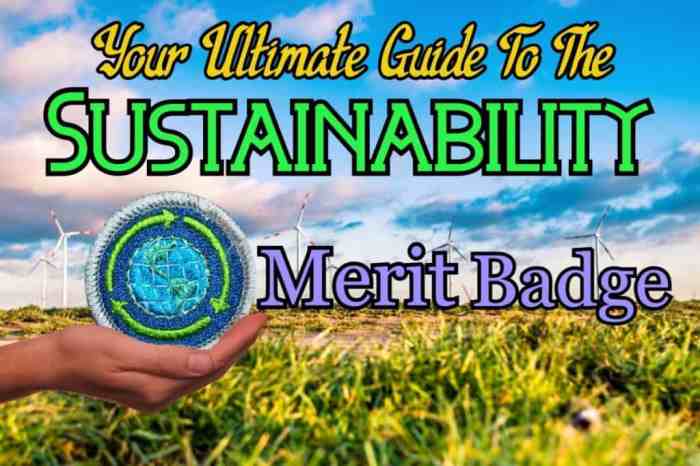
Community involvement is crucial for sustainability as it fosters collaboration, raises awareness, and empowers individuals to contribute to their surroundings. By engaging in local initiatives, residents can create a positive impact on environmental, social, and economic aspects of their community.
Ways to Get Involved
There are numerous ways to get involved in your community. Here are a few suggestions:
- Volunteer for local organizations focused on environmental protection, energy efficiency, or waste reduction.
- Participate in community cleanups, tree planting events, or recycling drives.
- Attend local government meetings and voice your support for sustainable policies.
- Join community gardens or urban farming projects to promote local food production and reduce transportation emissions.
- Educate others about sustainability through workshops, presentations, or social media campaigns.
Sustainable Community Projects
Many successful community projects have demonstrated the power of collaboration for sustainability. Here are a few examples:
- Community solar gardens: Residents pool resources to install solar panels on shared land, generating renewable energy and reducing carbon emissions.
- Urban rain gardens: Bioswales and rain gardens capture and filter stormwater runoff, reducing pollution and flooding while providing habitat for wildlife.
- Community composting programs: Residents collect and compost organic waste, diverting it from landfills and creating nutrient-rich soil for local gardens.
- Community-supported agriculture (CSA): Farmers and consumers collaborate to provide fresh, locally grown produce while supporting sustainable farming practices.
Education and Outreach
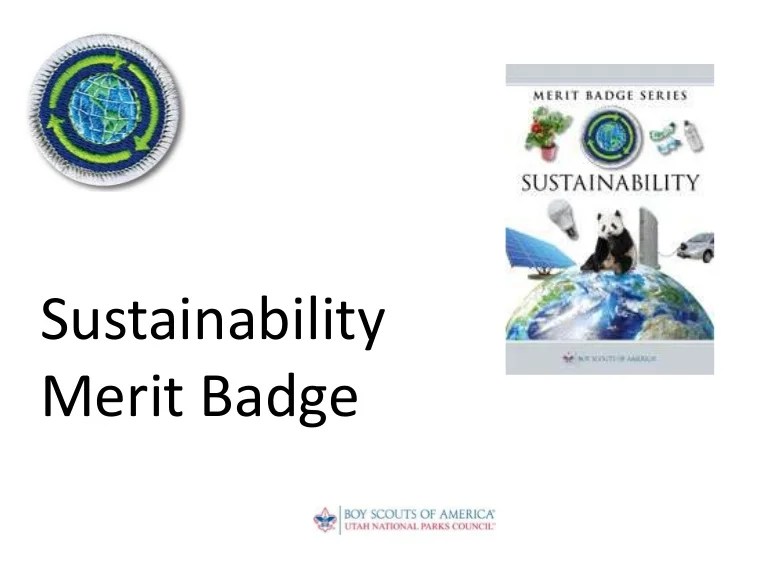
Educating others about sustainability is crucial to foster environmental stewardship and promote sustainable practices. By raising awareness, we empower individuals to make informed decisions and adopt sustainable lifestyles, leading to a positive impact on the environment.
There are various ways to educate others about sustainability. One effective method is through formal education, integrating sustainability concepts into school curricula at all levels. This approach provides students with a comprehensive understanding of sustainability principles and equips them with the knowledge and skills to become responsible environmental stewards.
Sustainability Education Programs
Numerous sustainability education programs have been developed to promote environmental awareness and encourage sustainable practices. These programs often focus on specific aspects of sustainability, such as energy efficiency, water conservation, or waste reduction.
- The Green Schools Program, initiated by the U.S. Environmental Protection Agency (EPA), empowers schools to reduce their environmental impact through energy-efficient practices, waste reduction, and water conservation measures.
- The Sustainable Living Challenge, organized by the Sustainable Living Foundation, encourages individuals to adopt sustainable habits and track their progress through an online platform.
- The Earth Charter, a global declaration of ethical principles for sustainability, provides a framework for education and outreach initiatives that promote environmental responsibility and social justice.
Career Exploration: Sustainability Merit Badge Guide
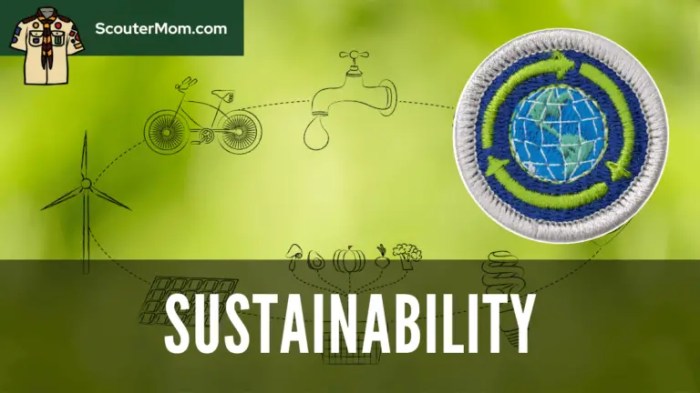
The field of sustainability encompasses a wide range of professions dedicated to promoting environmental stewardship, economic vitality, and social equity. Sustainability careers offer rewarding opportunities for individuals passionate about creating a more sustainable future.
To pursue a career in sustainability, individuals typically require a strong foundation in environmental science, sustainability studies, or related fields. Additional training and certifications in specific areas, such as energy efficiency, water conservation, or waste management, can enhance employability.
Education and Training
A bachelor’s degree in sustainability or a related field provides a comprehensive foundation for a sustainability career. Master’s degrees or specialized certifications can further enhance knowledge and skills in specific areas of interest.
Career Paths
- Environmental Consultant:Provide guidance to businesses and organizations on environmental compliance, sustainability strategies, and waste reduction.
- Sustainability Manager:Oversee sustainability initiatives within organizations, including energy efficiency, water conservation, and waste management.
- Energy Auditor:Conduct energy audits to identify areas for improvement in energy efficiency and reduce operating costs.
- Water Conservation Specialist:Develop and implement water conservation strategies to reduce water usage and protect water resources.
- Waste Management Specialist:Manage waste disposal and recycling programs, promoting waste reduction and resource recovery.
Final Review
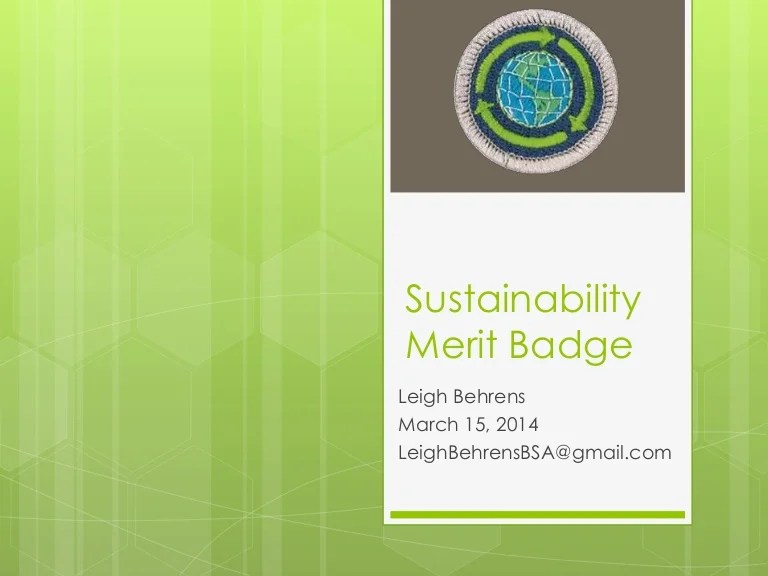
The Sustainability Merit Badge Guide is an invaluable resource for Scouts who are passionate about making a difference in the world. By completing the requirements, Scouts will gain the skills and knowledge necessary to become responsible citizens and environmental leaders.
Q&A
What is the Sustainability Merit Badge?
The Sustainability Merit Badge is a Boy Scouts of America merit badge that teaches Scouts about the principles of sustainable living and environmental stewardship.
What are the requirements for the Sustainability Merit Badge?
To earn the Sustainability Merit Badge, Scouts must complete a series of requirements related to environmental stewardship, energy efficiency, water conservation, waste reduction, sustainable living, community involvement, education and outreach, and career exploration.
What are the benefits of earning the Sustainability Merit Badge?
Scouts who earn the Sustainability Merit Badge will gain the skills and knowledge necessary to become responsible citizens and environmental leaders. They will learn how to conserve natural resources, reduce their environmental impact, and live a more sustainable lifestyle.



